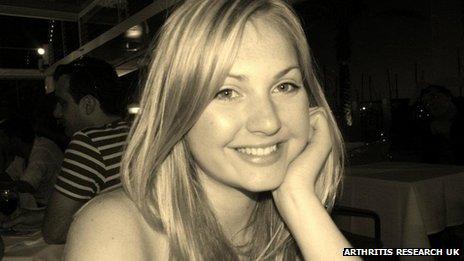'Arthritis was so painful I couldn't sit my exams'
- Published

Emily Jones was 15 years old and preparing to sit her GCSEs when her plans were halted by the unbearable pain she was experiencing in her hands and knees.
"I couldn't wear jeans or any tight clothing because the pain in my knee was so intense," she said.
"Then I started to get pain in my hands. During an art exam, my friend had to squeeze paint into pots for me because I just couldn't do it."
For months, Emily, from Cardiff, had put up with painful swelling in her joints before she was finally diagnosed with juvenile idiopathic arthritis (JIA) just a week before her exams started.
Normally thought of as an affliction of the elderly, arthritis affects around 15,000 children and young people in the UK.
The disease can be more severe in adolescents than adults, but experts do not know why.
Emily says it was a relief to put a name to her pain, but at that stage in her life it was also devastating to find out she had a chronic condition.
She was unable to sit most of her exams and the side-effects of the drugs she was given left her feeling ill and exhausted.
'Indescribable pain'
Michelle Oliver, from Sunderland, was diagnosed with JIA when she was just eight-years-old.
Now 28 and a marketing and business development officer, she has lived with stiff and swollen joints for many years. But she says it was particularly difficult during her teenage years.
"Having arthritis as a teenager was challenging. Your teenage years are hard enough without having a condition that makes you different from your friends.
"Nobody in my family had any idea that children or young people could get arthritis. They still don't know where it comes from.
"I have pain in my neck one day, then pain in my elbows the next. It can move around. It's an indescribable pain, which never goes away.
"It was very hard for me from a young age."
Michelle is due to have her right hip replaced next year - her third hip replacement since the age of 17.
The first was during her university degree. She had to learn how to walk again, how to go up and down stairs and her degree took longer to finish as a result, but she has no regrets.
"It changed my life," she says.
Big gap
Researchers from the Arthritis Research UK Centre for Adolescent Rheumatology, set up in collaboration with University College London, University College Hospital and Great Ormond Street Hospital (GOSH), want to understand why young people like Emily and Michelle are affected by rheumatic diseases and how they can improve their treatment.
Prof Lucy Wedderburn, director of the new centre and a consultant at GOSH, says this will require large-scale studies and clinical trials specifically involving young people with arthritis - and not adults, who have been the focus of most research in the past.
"I feel strongly that teenagers and adolescents have different needs, but there's a real gap in our knowledge," she says.
It could be that teenagers experience changes in their immune systems during puberty which triggers auto-immune diseases like arthritis.
Researchers also want to know why some people are more susceptible than others to particular types of arthritis during adolescence and how these develop in adult life.
Finding the best drug to treat each young person with is another huge challenge, says Prof Wedderburn.
"Waiting to find the right drug is a major burden. We want to be able to say 'you fit this drug'."
Side effects
The first drug Emily tried gave her awful headaches and stomach aches and left her feeling extremely tired. Soon after, she changed to an injection form of the drug but the symptoms did not improve.
"I'm now on injections once a week but it's still not working as well as I would like," she says.
This frustrating trial and error process with drug treatments is what researchers are desperate to eradicate, along with the debilitating side effects of many drugs.
Michelle has tried various medications over the years which have caused hair loss, allergic reactions and sickness among other side effects.
She has also spent years on steroids which have stunted her growth and could create problems with osteoporosis later in life.
She would love to come off the steroids, but she knows that her body would not cope with a reduced dose.
On a daily basis, her arthritis affects so many small aspects of her life.
Heavy bones
Michelle says: "If I have a cup of tea, I have to hold the kettle at a strange angle to pour it.
"I can't bend down to pick things up easily, I have to buy bottles, not cans, because I can't open them and I find it difficult to tie my hair up.
"Also, when I'm getting dressed I have to think, 'will I be able to pull this off at the end of the day'."
Emily is now 17 and excited about moving away from home to go to university next year after managing to finally sit her exams with the help of a scribe.
But she is frank about the day-to-day challenges she will have to face living on her own.
"Mornings are difficult. Getting up can take an hour because of my fatigue. My head and bones feel very heavy.
"I can't bend my hands in the morning either so I can't rush, or get out of the house quickly."
Despite the difficulties they face every day battling with their bodies, both Michelle and Emily feel the disease has made them stronger and more focused as people.
As Michelle says, "Arthritis helped me become the person I am today - open-minded and determined. I've had challenges to face, but just had to get on with it."
- Published14 October 2012
- Published27 May 2012
- Published9 May 2012